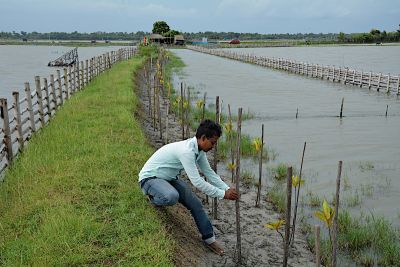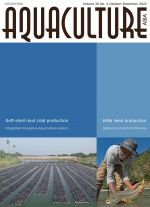A pilot of integrated mangrove-aquaculture as a nature-based solution to mitigate climate change in West Bengal, India
30 October 2022 | Sourabh Kumar Dubey, Udo Censkowsky, Apurba Saha, Ajanta Dey | 388 Downloads | .pdf | 2.74 MB | Aquatic plants, Environment and sustainability, India
Nature-based solutions are interventions that aim to protect, restore and sustainably manage natural and modified ecosystems to benefit human well-being and biodiversity and address societal concerns. Integrated mangrove-shrimp farming or simply aquaculture is the coexistence of mangroves and shrimp aquaculture in a tide-fed environment. In comparison to other shrimp farming systems, integrated mangrove-shrimp farming can additionally produce timber and supports biodiversity.
To understand the possible benefits of mangrove integration, our consortium compared three integrated mangrove-aquaculture systems together with three local farmers in North 24 Parganas. The long-term objectives were:
- To improve the shrimp farming environment and establish a mangrove-based organic system.
- To increase shrimp and fish productivity through mangrove-based nutrient recycling in ponds.
- To fortify the carrying capacity of the farm and the adjacent coastal ecosystem.
- Mangrove restoration, carbon sequestration and income generation
This article describes our findings, and important factors to consider before deploying integrated mangrove-aquaculture systems.
Publisher: Network of Aquaculture Centres in Asia-Pacific
Rights: Creative Commons Attribution.

